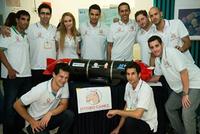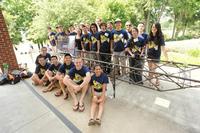-
Suburban Chicago police cancels anti-terrorism training course after complaints
The police at the city of Lombard, Illinois, has cancelled a class on counterterrorism after the Chicago branch of a Muslim advocacy group complained that the Florida-based instructor and his teachings were blatantly anti-Muslim. The instructor has faced similar criticism in Florida. The course was to be taught through the North East Multi-Regional Training group, which trains Illinois police and corrections employees. The Illinois Law Enforcement Training and Standards Board said it was reviewing the course – titled “Islamic Awareness as a Counter-Terrorist Strategy” – and the materials used in it. The board said that instructor’s qualifications will also be reviewed.
-
-
Budding scientists visit leading U.K. science facilities
A group of budding science students visited some of the U.K.’s leading science facilities last week as part of their prize for projects in a national competition. The students all took part in the finals of the U.K. National Science & Engineering Competition at this year’s Big Bang Fair in London. They were judged to be the winner and runners-up for the Institute of Physics (IOP) prize, awarded for the best physics project.
-
-
Eighty-six collegiate teams compete for the best car design and build
Eighty-six teams competed in the Baja Society of Automotive Engineers competition in Bellingham, Washington to determine the Baja car with the best design and build. Every year, collegiate automotive clubs enter to compete in any of the three national competitions that test the design, speed, maneuverability, and endurance of a student-manufactured Baja car — a frame-only vehicle used for off-roading and high adventure activity. Arizona State University’s Sun Devil Motorsports Team improved its ranking from 37th last year to 17th this year.
-
-
U.S. Navy, City of Chicago team up to promote STEM education
The Department of the Navy (DoN) and City of Chicago last month kicked off a unique collaboration to give high school and community college students an intense, hands-on experience in naval-relevant science, technology, engineering and mathematics (STEM) education.
-
-
Nuclear academics, professionals meet for 6th annual ATR NSUF Users Week
The sixth annual Advanced Test Reactor National Scientific User Facility (ATR NSUF) Users Week was held 10-14 June at University Place, the satellite campus for Idaho State University and University of Idaho in Idaho Falls. This nuclear research-themed week was the user facility’s opportunity to update the user community on nuclear energy issues and tools, conduct a research forum where users can come and present their research, run specialized workshops, and build collaboration among academic, industry and government institutions.
-
-
Teachers honored for inspiring tomorrow’s generation of engineers
The future of the engineering profession received a boost when the National Engineers Week Foundation announced the three winners of the 2013 DiscoverE Educator Awards on 3 June. Now in its second year, the program recognizes educators teaching grades 6 through 12 for their effective methods to interest kids in engineering through math and science. The American Society of Civil Engineers (ASCE) is a sponsor of the award.
-
-
New underwater robots mimic designs found in nature
In recent years, robotic underwater vehicles have become more common in a variety of industrial and civil sectors. Now, a new class of underwater robot has emerged that mimics designs found in nature. These “biomimetic” vehicles promise to lead to new underwater technologies that could help the oil and gas industry, underwater humanitarian demining, environmental monitoring, search and rescue operations, anti-terrorist activities, harbor surveillance, coastal security and fisheries management, and more.
-
-
Young engineers compete in underwater robotics race
Student-built autonomous underwater vehicles will speed through the depths of a Navy pool in a battle for supremacy at the 16th International RoboSub Competition. The competition is being held this week (22-28 July). In addition to building autonomous underwater vehicles, teams are also responsible for creating Web sites and writing journal papers that outline their work.
-
-
Ben-Gurion University student team’s Hydro Camel competes in RoboSub Competition

Today, there are many remotely operated submarines that handle important tasks, such as checking underwater pipelines, mapping underwater minefields, searching for locations to place communication cables, and searching for sunken vessels. These marine vessels, however, are limited by effective communication cables and require frequent human-operator contact. Ben-Gurion University of the Negev is developing a more accurate and effective autonomous, independently thinking underwater vessel that would revolutionize these and other tasks. The BGU entry in the RoboSub Competition is called Hydro Camel.
-
-
STEM education and U.S. national security
Los Alamos National Laboratory director Charlie McMillan will be one of seventeen speakers at this year’s TEDxABQ. TEDxABQ is an independently organized event in Albuquerque, New Mexico, affiliated with the popular TED Talks series.McMillan will discuss the linkage between early education in science, technology, engineering, and mathematics (known as STEM) and national security.
-
-
Better teaching for inquiring minds
Inquiry-based learning is an educational method centered on the investigation of questions, scenarios, or problems. It is seen by many as a positive alternative to traditional forms of instruction where students are required to simply memorize information.
-
-
Growing cybersecurity opportunities for young Americans
With the growing number of cyberattacks on U.S. companies, government agencies, and critical infrastructure, and the likelihood that such attacks will only increase, there has been a corresponding increase in the number of cybersecurity programs and educational opportunities for young Americans.
-
-
U California, Berkeley students win National Student Steel Bridge Competition

The weekend of 31 May residents of Washington State watched as engineers began erecting a temporary steel bridge over the Skagit River, to replace the 160-foot span of a 4-lane bridge that had collapsed a week earlier, after being struck by an over-height truck. Just sixty miles away, on the campus of the University of Washington in Seattle, 620 civil engineering students erected their own temporary steel bridges in a competition to demonstrate their engineering skills. For the second consecutive year and for the second time in the past seven years, a team of students from the University of California, Berkeley captured the title as champions of the ASCE/AISC National Student Steel Bridge Competition (NSSBC).
-
-
Israel taps 10th graders’ cybersecurity skills to expand cybersecuity recruitment pool
Israel has been subjected to a growing number of cyberattacks – and has itself used cyber-warfare against its adversaries. To make sure it stays ahead, Israel is accelerating its recruitment and development efforts in cybersecurity. Among other initiatives, the country is expanding the pool of potential cyberwarriors by going into high school classrooms to tap the cyber skills of tenth-graders.
-
-
Sandia Lab hosting conversations on engineering
U.S. prosperity depends on effective use of engineering to turn scientific innovation into products that come rapidly to market and increasingly are made in the United States. Sandia Lab has launched a series of conversations a aimed to help identify what the nation’s engineering community can do to make sure technical talent will be available in the future, prepare engineers for the twenty-first century, and secure U.S. leadership in a global economy which is increasingly focused on innovation.
-
- All
- Regional
- Water
- Biometrics
- Borders/Immig
- Business
- Cybersecurity
- Detection
- Disasters
- Government
- Infrastructure
- International
- Public health
- Public Safety
- Communication interoperabillity
- Emergency services
- Emergency medical services
- Fire
- First response
- IEDs
- Law Enforcement
- Law Enforcement Technology
- Military technology
- Nonlethal weapons
- Nuclear weapons
- Personal protection equipment
- Police
- Notification /alert systems
- Situational awareness
- Weapons systems
- Sci-Tech
- Sector Reports
- Surveillance
- Transportation
Advertising & Marketing: advertise@newswirepubs.com
Editorial: editor@newswirepubs.com
General: info@newswirepubs.com
2010-2011 © News Wire Publications, LLC News Wire Publications, LLC
220 Old Country Road | Suite 200 | Mineola | New York | 11501
Permissions and Policies
Editorial: editor@newswirepubs.com
General: info@newswirepubs.com
2010-2011 © News Wire Publications, LLC News Wire Publications, LLC
220 Old Country Road | Suite 200 | Mineola | New York | 11501
Permissions and Policies
